Empowering minds: 5 Black educators making a difference in Eugene, one student at a time
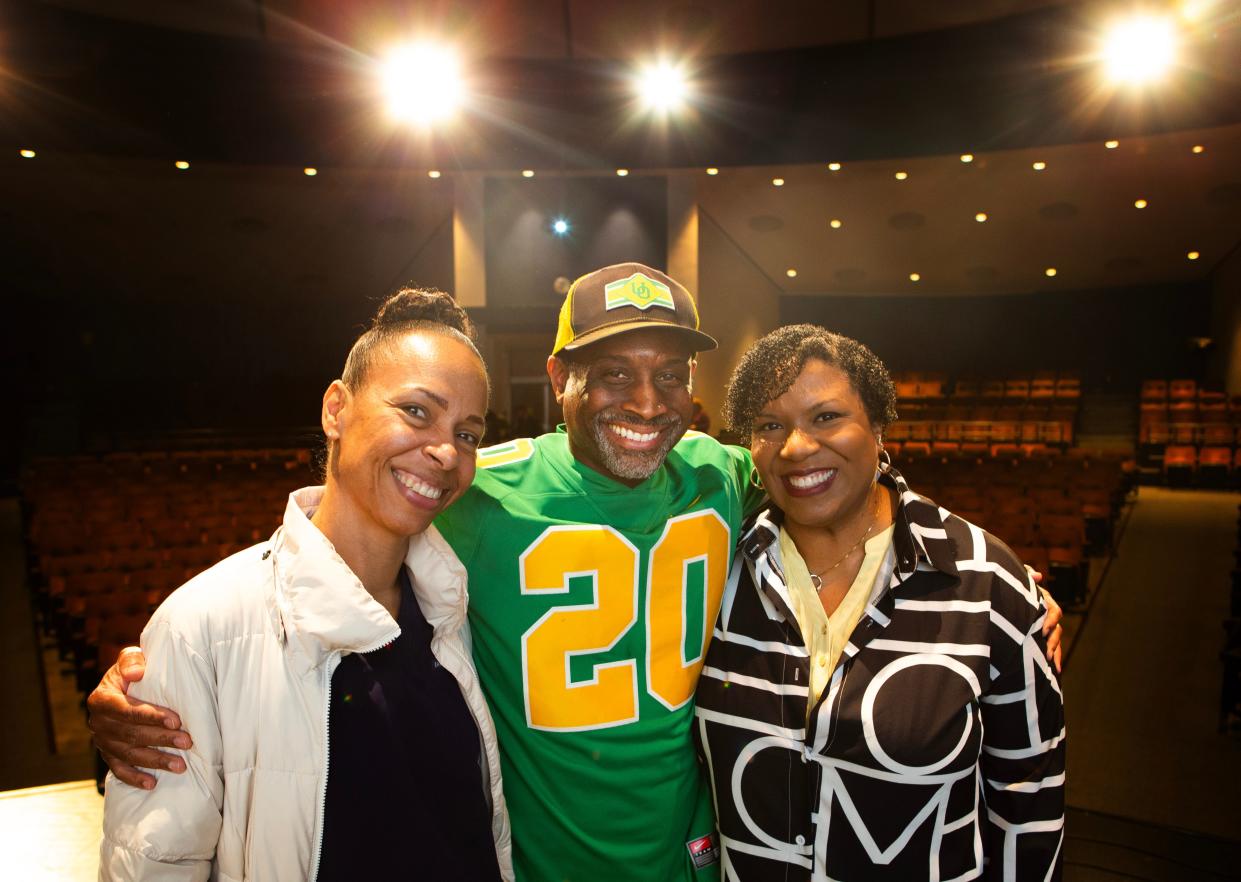
For Black History Month, the Register-Guard spoke with five Black educators who are making a difference for their students and the community.
These high school teachers are highly praised by colleagues and students, not only for their daily efforts as teachers but also for creating an inclusive environment, demonstrating the value of representation and ensuring all students feel seen and included. They promote social justice and culturally responsive curriculum by teaching inclusively, encouraging students to speak their truths and find their voices.
These educators are highly involved in their communities, inspiring positive change and acting as role models and leaders for students and staff. Their diverse backgrounds and personal experiences inform them in the classroom setting, where they hope to build a stronger education system and encourage student growth.
Kevin Summerfield: "It's all out of love for the students"
Kevin Summerfield didn't expect to become a teacher.
He grew up in a Black neighborhood in Portland where he says he learned three languages: street, work and educated. When he came to Eugene as an adult, working for his then-girlfriend's father in construction, he realized he wanted a different path.
He started attending Lane Community College, working toward a career as a dental hygienist, but his counselor encouraged him to pursue family and human services as a major instead. Summerfield transferred to the University of Oregon to complete his degree.
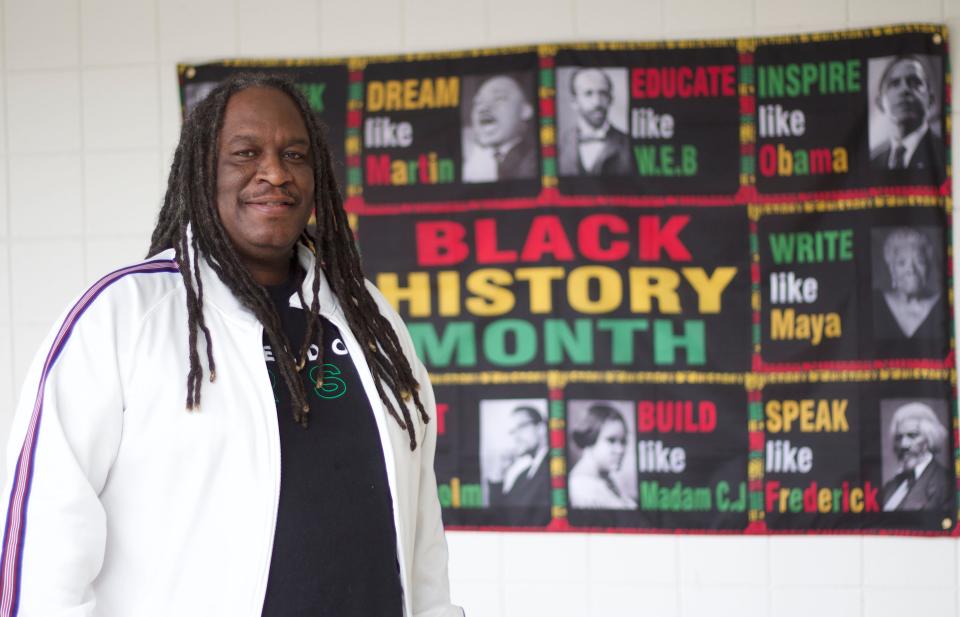
Summerfield got a job at the now-closed Bailey Hill Instructional Center, where he worked with at-risk youth. Local leaders noticed his skill in leading young people and the then-principal of Churchill High School invited him to observe the school.
Eighteen years ago, Summerfield began working at Churchill High, where he served as a semi-informal campus supervisor, consulting on equity. He recalled his classroom, which he affectionately called the "front porch," being a safe space for students. He accepted a formal position as campus supervisor a few years later, working at Churchill for a total of 15 years. Summerfield knew he wanted more.
Summerfield took his first certified teaching role in 2021 at Sheldon High School, where he still is now. Summerfield earned his masters through the Lane Regional Teacher Pathways Scholarship and became certified. He jumped into his role at Sheldon as a teacher without any student teaching experience. He recalled feeling overwhelmed on his first day on the job.
"That first week, I cried because I was like, 'Oh, my gosh, this is hard,'" Summerfield said.
As he began teaching right when in-person classes were starting up again, the face of education had changed dramatically. Much of the curriculum was made available on Canvas, an online learning platform that many districts used, and he felt lost, trying to engage with the students who seemed uninterested in one-on-one interactions with the teacher.
"It was tough, but the more I started honing in on my skills ... I balanced between worksheets and live-action production," Summerfield said. "People were like, 'That's probably good that you didn't have to student teach,' because I'm not trying to be someone else."
Summerfield developed the sociology course he now teaches over the summer, and it has been a success so far.
Summerfield was recognized with Eugene School District 4J's A Champion in Education (ACE) Award in 2021 as an educational assistant. He was nominated again as a teacher in 2023.
For Summerfield, it's all about building a bond with his students.
"It's all about the kids," Summerfield said. "I want to be that water that waters them, the sun that shines on them, and watch them grow."
Throughout his interview with the Register-Guard, students continually knocked on Summerfield's classroom window, asking to come in. Summerfield explained he normally plays music and lets students hang out in his room during the 10-minute breaks between classes.
He said he makes a point to check in with students, asking how their weekend was, if they've eaten, if they've slept properly — Summerfield said a student needs to be mentally and physically healthy before they can learn. He always has snacks available for students to grab if needed.
"I don't have power struggles with students, because I build relationships with students," Summerfield said. "I remind myself what it's like to be a student. There's times you have stuff at home going on, (thinking about) your image in school, and it's hard to focus. I built what I do around that ideology."
Summerfield said his students keep him young. They teach him new words like "rizz," which is slang for charisma.
"I feel like we learn together," Summerfield said. "I don't know everything and nor should I know everything ... I find that I'm approachable."
He practices "box breathing" with his students, which is a slow-breathing technique, to help them practice mindfulness before they head to their next class.
Summerfield's room is plastered with classroom expectations and goals, historic icons, drawings made by students and posters of cultures from around the world. He said he wants all students to feel represented.
"(My students) feel heard, and they feel cared about," Summerfield said. "They'll learn from you if they think you care about them."
Summerfield is the first male Black teacher ever at Sheldon. He is one of two current Black teachers at the school, along with Mary Youngblood-Lee, who teaches history. He said it can be lonely at times, but it's worth it that his students can say they have had a teacher of color and pass on a positive experience.
Summerfield has found that people are often surprised by the fact that he is a teacher. As a Black man, with his signature tracksuits, Sheldon swag and long hair, Summerfield said he's often mistaken for a football coach. He said that's one of the things he hopes to change.
"I'm a large, Black man, I gotta be the coach," Summerfield said, noting it was a common occurrence when he was at Churchill. "I want to change the perspective of Black individuals when they're working in schools, because most of the time, they think that they're the EA (educational assistant) or lower level, but they're just as smart as anybody else.
"I want someone to come into the building and ask me, 'Are you the principal?'"
With the Black Student Union, Summerfield helped coordinate several initiatives for Black History Month at Sheldon.
Throughout February, each morning, a different teacher comes on the announcements and talks about a significant Black person who is relevant to the subject they teach. For the month, Sheldon has a banner with Black leaders throughout history displayed near the front office.
Summerfield also said there has been an emphasis on intersectionality this month. Student groups are asked to find famous people who intersect with another affinity group and African Americans, such as Afro-Latino leaders, Black LGBTQ+ leaders and mixed-race individuals. Flyers could be found around the school, teaching students about these individuals and about intersectionality.
Although these initiatives are great for honoring Black History Month, Summerfield said this education shouldn't be limited to February.
"I say, Black history is all year round," Summerfield said. "It's all of our history."
Keri Pilgrim: "We have a really solid group"
Keri Pilgrim has always been called to work with high school-age students. As the Health Services Pathway teacher at Churchill High School for eight years, Pilgrim has certainly fulfilled her calling.
After growing up in San Jose, Pilgrim moved to Eugene in 2003. Since she began her educational career in 2007, she has taught a wide variety of subjects at the high school level, many in the scientific field. She started her career at Pleasant Hill High School, teaching biology, Advanced Placement biology, ecology and life sciences, and ballroom dance. She then worked in Portland from 2012 to 2015, first at Central Catholic High School, then Grant High School, teaching multiple science and dual-credit courses.
Pilgrim said working with adolescents is particularly rewarding for her.
"You get to see students growing into who they are going to become as an adult," Pilgrim said. "It's not that other educators don't get to see glimpses of that, but a lot of that identity work is happening at the high school level. They're sparking interest in potential careers. They're just growing in so many dynamic ways that it's really a privilege to be there."
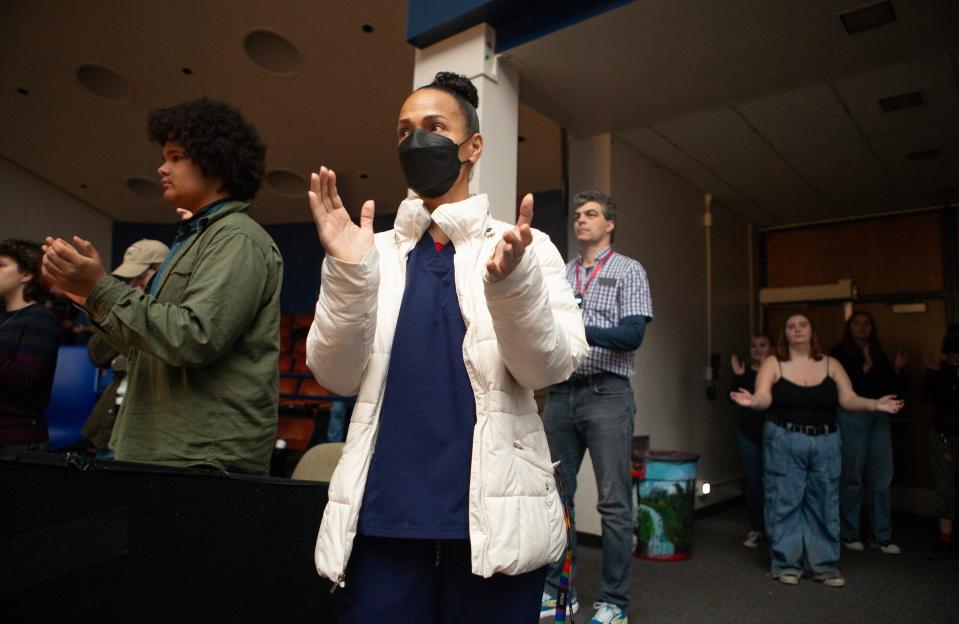
Pilgrim earned her career and technical education certification, and shortly after began working as the Health Services Pathway teacher and coordinator at Churchill. The CTE pathway includes classes on medical terminology, anatomy and physiology, health occupations and healthcare foundations. Students are able to explore different careers in the healthcare field and are able to participate in a medical internship their senior year.
Pilgrim said she sees gaps in the transitional period from high school to adulthood, but CTE is one pathway that can hopefully ease that transition.
"It's been an interesting puzzle, especially from the career, technology education perspective, of trying to figure out how we can better help young people transition into their professional and pre-professional lives," Pilgrim said. "Do they have the critical thinking and the strength of identity and character and value to stand up for what they believe in and what they think is right? ... I want them to be able to not just be successful in what they do and in their jobs, but I want them to lead a balanced life, and I want them to live a healthy, happy life in that way. I want them to feel comfortable and able to have a voice for social justice.
"I think Churchill does a really good job providing the opportunity for students to practice all of those things."
Pilgrim's passion has been recognized on the statewide and national scale. She was Oregon Teacher of the Year in 2019, spending the year as a spokeswoman and representative for all Oregon teachers.
During the pandemic and online learning, Pilgrim spent time acting as tech support and like mentoring of teachers as they transitioned to remote education. Shortly after, 4J started a new mentorship program for incoming teachers, a program Pilgrim helped develop. Pilgrim now spends about half of her working day as a mentor next to her CTE work. The voluntary program offers one-on-one mentorship with experienced 4J teachers, intending to promote teacher retention, especially for teachers of color.
"It's been highly teacher-focused and very personalized towards their individual learning goals, driven towards equity in the district," Pilgrim said.
Teachers who are new to the district, but have experience can be part of the program for one year, while completely green teachers have mentorship for three years.
While it's still fairly new, Pilgrim said early results are showing benefits for the teachers involved.
"Everyone can benefit from having a coach. The role of a coach can be someone who can offer instructional advice and support, but at times, it's also someone to simply listen and empathize and understand the rigors of the work, and to be there when times are tough" Pilgrim said. "It's helped me build relational capacity with other teachers and other staff and educators. It's helped me become a better communicator. Then, it's also helped me be a better, more compassionate communicator in my own classroom."
As a Black educator, Pilgrim knows first-hand the pressure of taking on many different roles.
Like all educators, Pilgrim works to improve her own program and curriculum, works to support students one-on-one, and takes on leadership roles in the community. But Pilgrim said there's an added layer of students and families that may only feel comfortable coming to her, something she understands and wants to support.
Pilgrim has been asked to participate in several community groups and boards. She said it can be hard to turn down offers to join these groups, as she knows the value of offering her perspective as a Black woman on community issues, but it can be exhausting. It's a balance between fulfilling all her duties as an educator and making time to be with her own community to recharge and avoid burnout.
"As an educator of color, I feel pulled in multiple directions," Pilgrim said. "Of course, we want to offer our voice, and we know there may not be someone else to fill the role who has that perspective. We might be tempted to be like, 'I have other things that I want to develop,' or 'there's other things that I want to work on.' But we make the space. We make the space, because it's important, and we know that we are a limited resource in our community.
"But the students do a lot to make a difference," she said. "We all get into it for the students, and if the students are wonderful, you just stay."
But in the Churchill, Pilgrim said there is a strong community. Not only is there a community of Black educators that can lean on each other, but it seems many students are eager to have discussions around race and equity, according to Pilgrim.
"I see young people being more impassioned and empowered about it in general," Pilgrim said. "We've been doing social justice and equity work for the entirety of our career, and every year − especially in the past six or so − it gets easier to do. I don't say that lightly, because it's never easy work. But it feels like, at least with this generation, with these kids, you can just sit down and talk about it. We don't have to do the prep work that you had to do before to lay the groundwork for why we're talking about it in the first place. They come to class wanting to talk about it. They just ask the questions. It's a norm now, as opposed to something that's relegated to a time of the month, or a specific day or a specific event."
The week of Feb. 19, Churchill held its Black Excellence Week, which featured five spirit day themes around Black culture and culminated in a school-wide assembly Thursday.
The Churchill Black Student Union also set up an informative display about the Black Lives Matter Movement on Wednesday.
Pilgrim said Black History Month can offer an opportunity for lessons beyond the standard curriculum. This applies to other nationally recognized months that highlight historically underserved groups such as Asian American and Pacific Islander Heritage Month, Native American Heritage Month or Hispanic Heritage Month. She explained today's standard curriculum still has a long way to go to fully depict the expansive diversity of the U.S. and history.
"Having months that are dedicated to folks whose stories have not been told, is a great opportunity for us to bridge some of that gap," Pilgrim said. "It doesn't have to be a whole lesson about specifically equity. It doesn't have to be a lesson about MLK, but it's just a moment to pause and say... 'Did you know that this was a contribution from a person of color?' or 'Did you know about this event?' or 'Did you know about this amazing work or art form?'
"It's just a moment to absorb something that isn't tangibly available within the standard curriculum, and it isn't worked into the standard day," she said. "I believe that a lot of us are trying to enrich our curriculum with more representative works."
Pilgrim said she is grateful her students are eager to hold challenging conversations around race, racial injustice, social injustice and more.
In her classroom, Pilgrim welcomes students to bring their own perspectives to inform their peers as well as Pilgrim herself. Pilgrim has seen a shift away from the traditional view of the teacher knows everything, and therefore the student must obey. She said the more they know they have a voice, the more at ease they feel.
"It isn't always about teaching, sometimes it's just lifting up their voice," Pilgrim said.
Nate Jackson: "Opportunity, when it knocks, you better answer"
Nate Jackson was intimidated when he was first offered a job to teach high school.
Jackson grew up in Portland and graduated from the University of Oregon with a degree in journalism, beginning a career in TV news and then entertainment in Los Angeles. At that time, Jackson said he was "laser-focused" on entertainment, finding success until, suddenly, the opportunities weren't coming as frequently.
Jackson recalled searching online: "jobs for extroverts." Teacher was one of the top suggestions. Testing the waters, Jackson began substitute teaching. He and his wife decided to return to Eugene, with Jackson's goal in mind of becoming a teacher. Soon after his arrival, Willamette High School Principal Dan Hedberg reached out to Jackson, asking if he wanted a full-time teaching job.
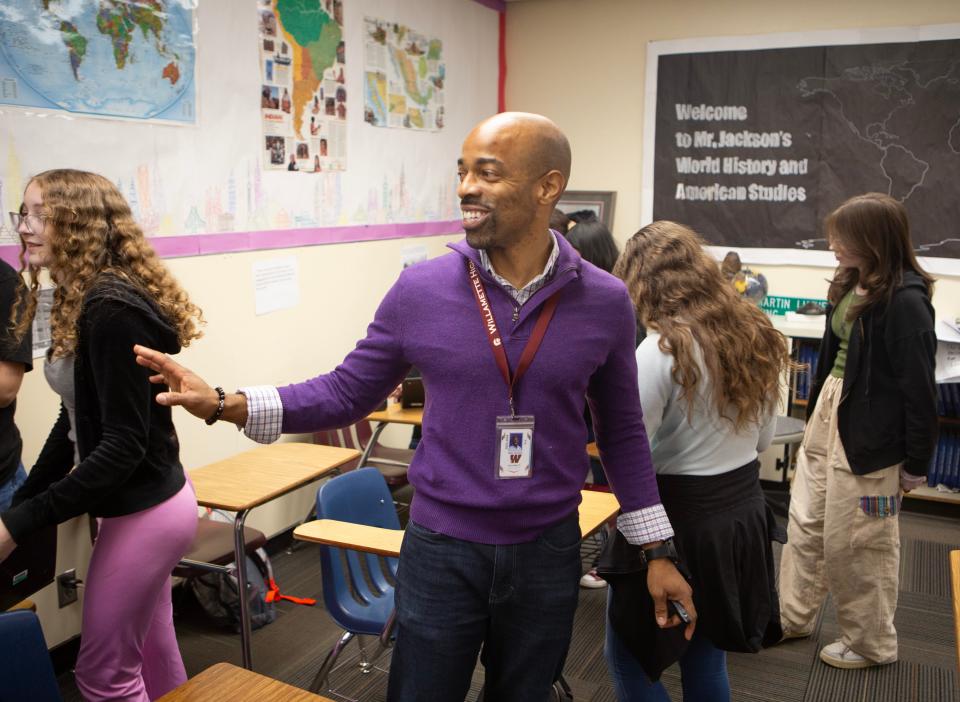
Most of Jackson's substitute teaching experience had been in elementary and middle school, so he was unsure of how teaching high school would go.
"For high schoolers. They're huge. They're tall, stronger than you, bigger than you and when you walk into class, they look at you, and you can tell they are assessing every movement, every mannerism, everything about you," Jackson said.
"(High schoolers) can be intimidating at first, but then when you start to talk to them... and you show them that you care about them, then no matter how big they are, they love you and they take care of you.
"I really, really believe that the students can do amazing things."
Now, Jackson teaches American studies, world studies and Black studies at Willamette High. He said history is essentially storytelling, which is something he can pull from his experience in news and entertainment.
"It's been an awesome dream job," Jackson said. "For the past five years, I literally get up excited for work ... I get to make impressions on young minds and empower them and strengthen them, and I get excited for it."
Jackson said he tries to provide complete histories to his students, taking care to include perspectives from Black history, Latino history, Asian history, women's history and more.
Jackson said he regularly looks for articles to find histories that may have been widely forgotten.
"I think that's what makes my classes interesting because students have heard the stock narrative of history," Jackson said. "When I give different perspectives, you see the students leaning forward. They're curious, and they're thirsty for more."
After getting settled in at Willamette High, Jackson sought out another type of extracurricular. Jackson said he reached out to a UO women's basketball coach after watching one of the games, encouraging the team to provide more in the way of entertainment. He suggested his voice for the job, having been an emcee for the University of California, Los Angeles women's basketball. He got the part after an audition during a packed Oregon women's basketball versus the USA basketball. Now, Jackson is the emcee for Oregon's men's basketball and football.
"It's an interesting dynamic that I have here," Jackson said. "My students, they'll come in my class and they'll say, 'I saw you at the game, and I told my mom or my dad, that you were my teacher and they didn't believe me.'
"It has been an unexpected journey, but I tell you, I delight in this journey every day."
Aside from his daytime job as a teacher and nights and weekends as an emcee, Jackson is one of the Black Student Union advisors at Willamette High.
Jackson noted that the population of Eugene is about 2% Black, and at Willamette, about 1.5% of students are Black. He said it was important for him to get involved in the affinity group.
"I want to be a part of creating a safe space for not just Black students, but for students of color, and the allies," Jackson said, noting that white allies have historically played a role in social justice, including the civil rights movement. "Civil rights with Martin Luther King, it wasn't exclusive to just people of color, nor is the BSU."
Jackson's next big goal with the BSU is to take them to Washington, D.C., a goal that will be realized thanks to a $36,000 grant through the Oregon Community Foundation.
Jackson said the five-day D.C. trip this summer would be an opportunity for students to see different cultures, tour several universities and see examples of successful Black people in power.
"A lot of the times, I didn't see a Black person in power (growing up)," Jackson said. "I saw Black individuals employed, or doing hard work, driving buses or janitors or grocers. But I did not see individuals in power positions. So my goal and my vision for the BSU was to just expose them to the other opportunities that may exist. There's a quote that says, you got to see it, to believe it, and then achieve it. So for me, I want to help them see it."
At Willamette High, the school recognized Black History Month with daily announcements from the BSU co-presidents. Willamette High also held a Blacknificent banquet to celebrate Black History Month.
Jackson said he wasn't teaching any specific lessons around Black History Month, because Black history is American history, and it shouldn't be relegated to one month.
"It is an honor for me to be a teacher," Jackson said. "It is an honor for me to be an ambassador of the community here in Eugene, and it is a dream that I could not have thought of myself."
Jennifer Scurlock: "I loved to learn new things"
Jennifer Scurlock is an educator largely inspired by her mother's experience.
Born and raised in Eugene, Scurlock was raised knowing the racism her family faced living in segregated Eugene after moving to town in the 1940s. She shared one of her mother's tragic experiences from when she was a little girl.
When her mom was 12, her two younger sisters were hit by a car and left unconscious on the side of the road. When onlookers called for an ambulance, none showed up to help the two young Black girls. They eventually found a local doctor who would treat them, and both girls, Scurlock's aunts, survived. This, and other stories that had been told to her as well as her own experiences of racism are part of Scurlock's "why."
"Part of my passion is to talk about the truth, to talk about cause and effect, talk about how historical elements impact the way that our community is today, and not to be afraid to talk about those things," Scurlock said. "I tell my students about (my mom). I always say I stand on her shoulders and my dad's. That's really my why, truly, that's my why. The blessing of, not only carrying their legacy, but the beauty of learning and curiosity and engaging in courageous conversations with students and sparking their curiosity is really a beautiful thing for me.
"I wanted to make a difference, and I knew that if I got into public education or education in general, that I could do that."
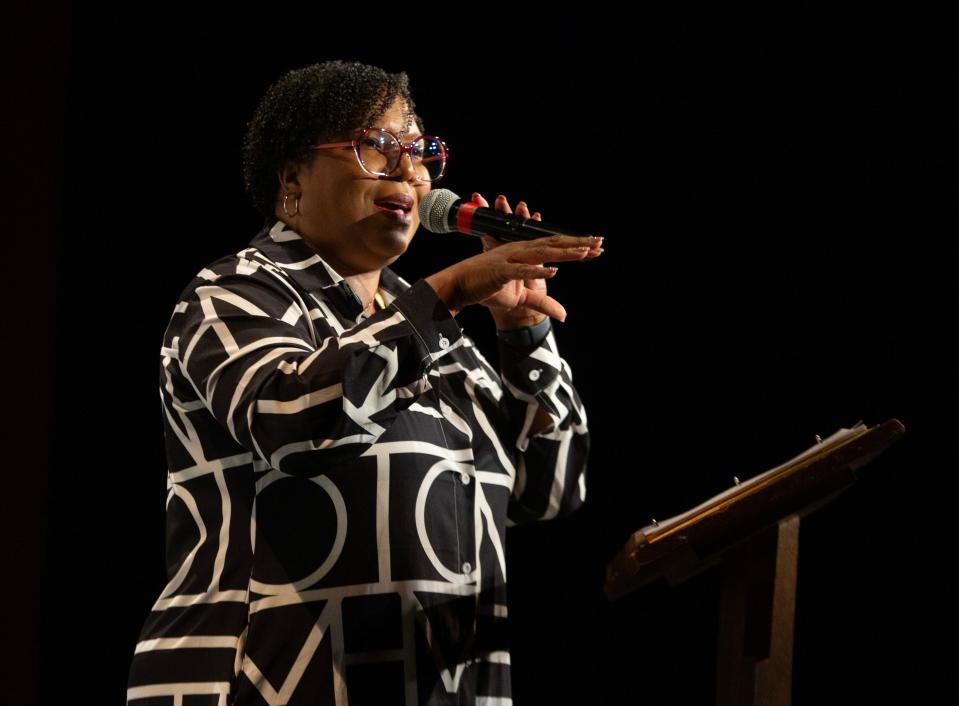
Scurlock began her educational career at 4J in 2003, teaching at Al Kennedy Middle School. She then taught at North Eugene High School until 2015 before transferring to Churchill High School where she is currently.
Scurlock now teaches Advanced Placement English Language and Composition and English 11 at Churchill High School.
Scurlock is able to celebrate all cultures in her lessons, making all students feel included and welcome.
"Sometimes at school, I felt like my culture was not seen as beautiful ... it was as if my only identity, my only connection to our world or America was slavery," Scurlock said. "When I decided to become a teacher, that was something I said I will never do. And when I engage in conversations with teachers at the local, state or national level, I talk about those experiences. And many of them will thank me because they didn't think about the impact of when educators do not celebrate different races, ethnicities, cultures, cultural practices."
Scurlock also teaches Ethics 101, also known as Courageous Conversations, after taking over the class from Leah Dunbar, who now works at Lane Education Service District.
The class allows students to do deep dives into research topics they want to learn more about in connection to diverse topics. The students then give presentations on these topics. Scurlock has had community members, school board members, state officials, and even recently, U.S. Representatives Earl Blumenauer and Suzanne Bonamici visited the class.
"I love exposing the kids to a lot of different topics that they may not be aware of," Scurlock said. "These kids, they really do great work ... I just love how the kiddos who say 'I can't' and they're nervous, and they're scared, how they find their voice. That's the real deal. That's one of the greatest joys of teaching, is helping kids to find their voice and helping them to shine."
Aside from teaching full-time, Scurlock is on several committees and boards.
Scurlock was formerly on the Board of Directors for the National Education Association, where she regularly met with Congress and served on the Oregon Education Association executive board for seven years, only stepping down from the role this summer to focus on other projects.
Scurlock also is the current vice chair of the Oregon State Board of Education. She was first appointed to the role by former Gov. Kate Brown in 2019, after House Bill 2512 required at least one active teacher to be on the state board. She was reappointed by Gov. Tina Kotek in 2023, with her term set to expire in 2027.
One of Scurlock's priorities on the state board is to uplift student voices.
"(During) direct reports that are given from various departments and ODE (Oregon Department of Education), I will ask about what student voice was involved or ask for student input," Scurlock said. "It's really helped me to empower students in those spaces. Similar to what I did, as an NEA director, I would bring student letters, I would have students write to the school board, mainly local. I would have them write letters to members of Congress. Continuing that civic engagement has been awesome."
She said she's been grateful to participate in change on the state and national levels.
At Churchill, Scurlock enjoys her students and her fellow staff that she sees daily. She hopes to uplift all voices and help build a community where all her students see each other and truly celebrate one another.
"For many of them, I'm their first Black teacher, African American teacher," Scurlock said. "I love that they can ask me questions, and I can share with them stories. They see our community in a different way. And then they can also see themselves as part of building community."
Gene Chism: "You can have conversations with me and you are being heard"
Gene Chism started his educational career in 2000.
After graduating from the University of Oregon, Chism began working as a special education educational assistant at Springfield Public Schools. He worked in various middle schools in the district and eventually moved up to being a special education instructor. Chism also worked at Springfield High School.
"I'm a middle schooler at heart, I spend a lot of time there," Chism said. "I think I can relate really, to the needs of the middle child. However, working in a high school, I feel like high school was chosen for me."
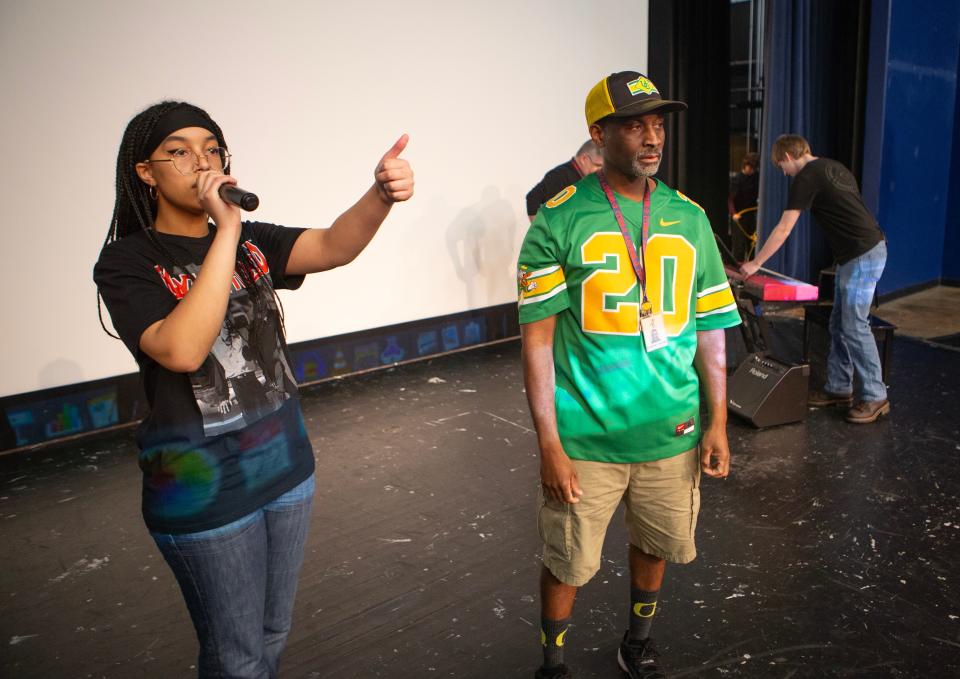
Chism now works as a Ninth Grade Transition Coordinator for Eugene School District 4J. The job involves being a liaison for local middle schools, ensuring incoming freshmen have a familiar face at the high school level, offering support to new high school students, and helping students develop their five-year plan to transition to high school and eventually out of high school.
"Knowing that you're sitting down and helping them with college scholarships and college applications and their resumes, all these things that help them become the young people that we believe they are, they really start to believe in it (their future)," Chism said. "They put two and two together to figure out 'this is my path.'"
He also helps coordinate events like the Summer Bridge Program, which brings incoming freshmen to their high schools for a week to familiarize themselves with the campus.
Chism said he views his role as an educator as preparing young people to be community members. He wants his students to be proud of the community they are a part of and want to improve their community.
"That's the most crucial thing to me, for students to know the quality of our time together," Chism said. "We built those relationships, where they can stand up and say, 'I am a part of this community and I'm gonna be a part of this community, the right way.'"
And Chism said this is something he's started to see reflected more and more in his students.
Chism said he is seeing students stepping up as leaders within the community. They have an interest in social justice and allyship.
"Our young people are not just students, they're ambassadors," Chism said. "They will speak up on injustice, and they educate. We've got students that sometimes come and lead staff meetings ... Our students present about social justice and, and the injustice of the world."
"They're not just going to school, they're going to school to make a difference."
Chism has seen students not afraid to ask tough questions about the world around them. He said in many ways, they are better at having such discussions than adults.
"Sometimes those tough conversations get choppy with other adults, people are very fearful of saying the wrong things," Chism said.
Chism stresses the importance of community and said one of his top priorities is making sure his students feel safe talking with him and know they are being heard.
As an educator of color, she is also able to offer a different perspective that some students can more easily relate to.
Chism said having diverse teachers that reflect the population they serve is vital, not only for students of color but for the entire student body. Having exposure to people with different life experiences based on their culture or race, especially in a region that is predominantly white, can enrich that student's knowledge and inform them if they choose to travel out of this town, state, or country, according to Chism.
"To have an educator of color to be your coach, mentor, teacher, role model is phenomenal," Chism said. "To have the capacity to have an experience with folks of color is monumental for the growth of students and staff. What we're starting to realize is there are some things that you may not know, but we may have in common."
Chism said he's still waiting for an educator workforce that fully mirrors the demographics of the student population it serves.
"That will have a tremendous impact on our students and in their educational journeys," he said.
Miranda Cyr reports on education for The Register-Guard. You can contact her at mcyr@registerguard.com or find her on Twitter @mirandabcyr.
This article originally appeared on Register-Guard: Meet 5 Black educators in Eugene who are making a difference

